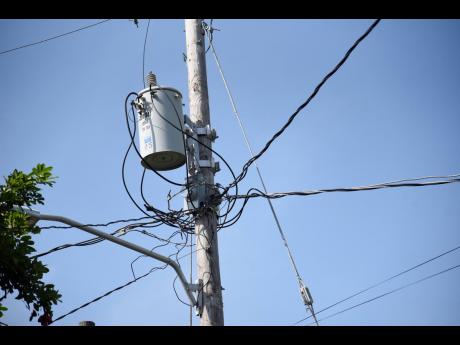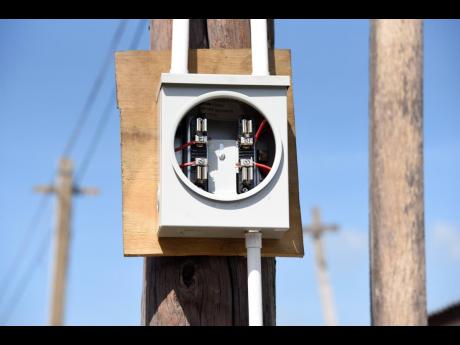Phillip Paulwell | Why inexplicable delays on Electricity Act review
I had hoped that the Government would have appreciated and jerked itself from its indefinite slumber after my previous article on the need for a greater sense of urgency to deal with the continuing energy crisis. Instead, the country continues to wallow in the state of inertia on the issue since 2016, during which time there have been four ministers, including the prime minister. What is worse, we are beginning to witness growing arrogance from this Government in its conduct as it gets used to the lop-sidedness of its strength of numbers in Parliament. They seem to be unmindful of the Sri Lankan experience.
A major issue of controversy has been the conduct of the Government in the review of the Electricity Act 2015, which was cited in two Gleaner editorials on July 15, 2022, and July 26, 2022. Such a pity that the Gleaner appeared less harsh than it should have been by failing to broadside the Government on its mismanagement of this crucial element of the energy portfolio.
I was the minister of energy that developed policy and piloted the process to have a new law dealing with electricity, replacing the 1890 Electric Lighting Act. It was clear to me then that the 2015 law was crucial at that time to expedite the objective of achieving diversification of the various sources. But it was to be an interim law subject to review before the end of five years. Section 60 of the Electricity Act requires that its provisions ‘shall be reviewed by a Joint Select Committee of the Houses of Parliament NOT LATER than five years after the appointed day. The Government has been in breach of the law for two years now!
Having belatedly established the Joint Select Committee (JSC) after my insistence, the committee commenced its work in some earnest in January 2021. After a period of intense review of the law with many meetings, and having heard many and varied presentations, the work of the committee was abruptly and strangely ended in February 2022. This came about after committee members started to express strong views for changes to the existing law. The minister seemed, throughout the period, to be disengaged in the process of the deliberation of the committee.
Why did the Government shut down the work of the committee? Who could have influenced such a move and why? The explanation given by the minister and later comments from the ministry appear to be that of a drowning man clutching at straws. It made no sense.
There was good sense for the law to be reviewed, and that work should have been completed some time ago.
RIGHT OF FIRST REFUSAL
Let us examine the issue of the Right of First Refusal.
One of the fundamental aims of the policy that fuelled the law was to achieve greater competition in respect of the generation of electricity in Jamaica. It was recognised early that competition on the transmission and distribution side of the business cannot be attained as the electricity grid could not be replicated. It should be noted that I had anticipated limited competition on distribution. This was to be achieved by allowing operators within Exclusive Economic Zones (Free Zones) the ability to generate and distribute electricity within that space. It is the only way to realise the full potential of the EEZ to achieve higher-paying jobs and dynamic growth in the economy.
So on the generation side, we wanted full competition eventually. It is the only way to ensure lower prices with the full access to the latest in technology. We, therefore, were very clear about the role of the Generation Procurement Entity (GPE). It is responsible for the procurement of “new generating capacity”. The language of the Act is explicit. Section 9 (1) states. Subject to subsection (2), an electricity licence may be granted by the Minister – a. Pursuant to procurement under a competitive bidding process initiated by the Generation Procurement Entity… .
The question that many reasonable persons asked is then, why would a right of first refusal be given to the JPSCo in the same legislation if the aim was to achieve competition on the generation side of the business?
My response is that it is precisely for that reason why there was an insistence that a review of the law be done within five years so that some of the admitted interim provisions could be addressed.
To be clear, when the government (both JLP and PNP) commenced the pursuit of energy diversification with the initial focus of incorporating liquefied natural gas (LNG), it was never the intention that JPSCo be the provider. There were two failed processes under both administrations to procure 360MW of electricity. These processes did not recognise any right of first refusal by the Government would have granted an energy licence to anyone who would have emerged as a successful bidder. I will not get into the details here as to why those processes failed, but I will say, in relation to my stewardship, certain negative comments and declarations by the then contractor general halted that process. And even though the OUR sued the contractor general for wrong interpretation of the rules, that matter was never decided as a secret, out-of-court settlement between the CG and the OUR prevented any embarrassment. It seemed clear to me then that a different approach had to be taken if we were to achieve our objective of introducing LNG within the timeline.
DEFEATING THE EFFORT
The attitude of suspicion that underlay the procurement process was defeating all our efforts. (By the way, this was in stark contrast to the procurement of 130MW of renewable energy for which we were commended by the same CG.), so the way to meet the schedule of new generating capacity, using LNG as the fuel, was to encourage the JPSCo to replace some of their existing ageing plants, and it was, therefore, written in the 2015 law to provide a legal shield. The intention was never for it to be perpetual as that would render the objective of competition unattainable especially in an environment of low growth in the demand for electricity. Besides, as someone who was instrumental in the development of our competition architecture, it is conceivable that other providers of electricity could claim under the Fair Competition Act unfairness as they don’t have a right of first refusal.
But while the review of the act has been paused, the JPSCo, it is reported, is busily exercising its right of first refusal over other existing capacity, and procurement is well advanced. That is fraught with danger for the poor consumer who cannot afford bad decisions that last for 20 years. It is also against the Government’s stated policy of achieving 50 per cent of renewables by 2030.
- Phillip Paulwell is member of parliament for Kingston East and Port Royal and former minister of science, technology, energy, and mining. Send feedback to columns@gleanerjm.com.



